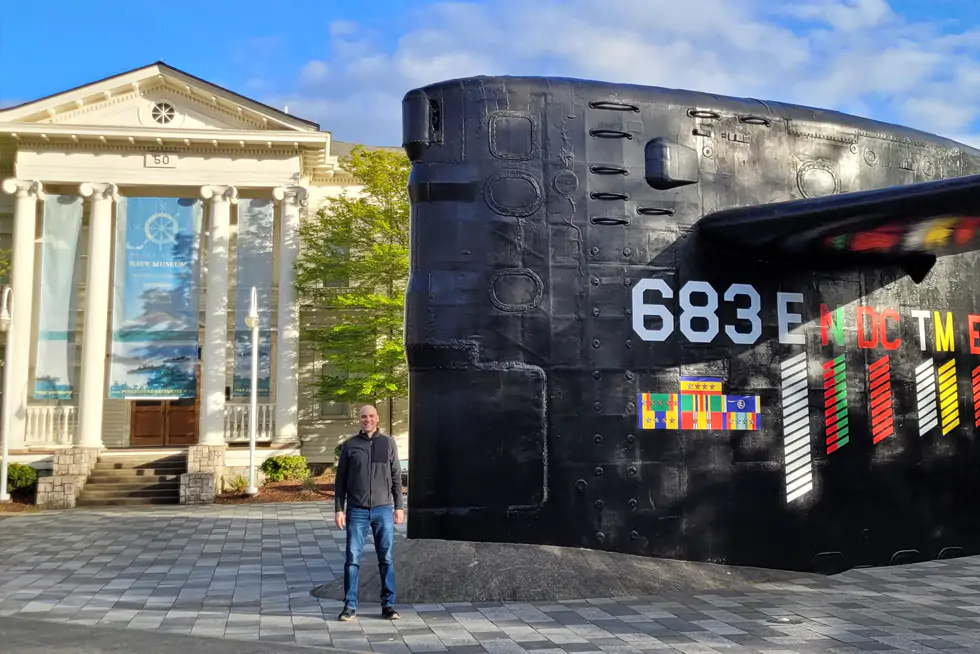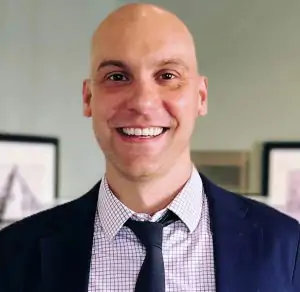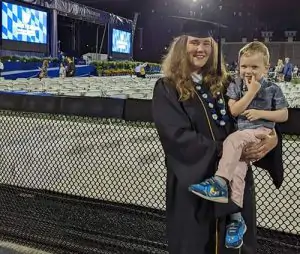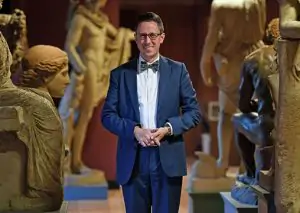For nearly 18 years, Johns Hopkins University’s MA in Museum Studies program has been attracting kindred spirits.

Dylan Hoffmann standing out in front of the Puget Sound Navy Museum in Bremerton, Washington.
Souls who attest to an affection for ancestry and artifacts, who bring an elevated eye for exhibitions, and a collective desire to manifest the magic of museums and to preserve heritage and cultural gems for generations to come. To support these students on their academic and professional journeys, nimble paths that marry theory and practice, the program uniquely offers “Alumni Ambassadors.” The Ambassadors are JHU graduates who are thriving in every area of the discipline across all corners of the country, and even internationally. They offer another level of support and mentorship to enrolled students who are hoping to break into or elevate their positions in the field with their Johns Hopkins degrees.
The graduate program’s leaders individually pair up current students with members of a robust network of graduates who voluntarily serve as another personal point of contact.
“We are very cognizant of the relationship building that happens in our program and are intentional in looking for ways to create and maintain community with current students, faculty, and alumni,” said Sarah Chicone, who serves as the director of the MA in Museum Studies and Master’s in Cultural Heritage Management programs. “People who work in nonprofits tend to be driven by passion and a desire to serve. They are also passionate about their subject expertise, and they want to share it with other people. Our ambassadors are very generous in helping our current students navigate their first semesters, offering suggestions on courses and advice on the challenges of maintaining work-life balance. They also help to connect them with other students. The Alumni Ambassador program is a win-win because our graduates are always looking for fulfilling ways to give back to our programs and to stay connected themselves. Our emerging professionals are grateful for these new connections.”
The far-reaching and significant impact that JHU graduates have in museum studies, a discipline that Chicone terms “a public good and social necessity,” is certainly not lost on her nor on the Ambassadors themselves.

Chicago native and ’22 JHU graduate Dylan Hoffmann serves as an Ambassador from the Pacific Northwest. Hoffmann, whose love of maritime history sprang from his childhood spent on Lake Michigan, now serves as the collections manager at the Puget Sound Navy Museum in Bremerton, Wash. It is one of 10 museums funded and administered by the U.S. Navy. Hoffmann credits his collections management professor Carlos Hernández-Monagas with opening his eyes to this area of museum studies and his own Ambassador for helping him form connections.
“My Ambassador actually lived in Chicago, where I was working as a middle school social studies teacher while attending JHU,” said Hoffmann. “I was so fortunate. I wanted to be an Ambassador because of all the help that I received while a student. Johns Hopkins was perfect. It was an incredible experience. I was blown away by how many people were willing to help, including people outside of Hopkins who I met during my two-week seminar. It was not always easy, and this is what I tell the students I work with. I encourage them to do as much as they can, volunteer and get as much experience as they can. I tell them that the field is competitive, but if you are willing to put in the time, you can typically have success, especially with a Johns Hopkins degree.”

Tory Schendel-Vyvoda ’21 mentors students from her role as the curator of the Evansville African American Museum located in Indiana’s Baptisttown neighborhood on the former site of the Lincoln Gardens housing development. Originally dedicated by Eleanor Roosevelt in 1937, a preserved, furnished section of one of the apartments showcases life during the era. The remainder of the building, dedicated in 1999, has been renovated into a modern museum serving to promote history, the arts, education programs, cultural events, and festivals.
“Truly, my experience at Johns Hopkins was one of the best academic experiences I have ever had,” Schendel-Vyvoda said. “I want to make sure that I am giving back my time to something that was so important to me to amplify and spread that culture. I assure the students I mentor that the struggle is part of the process and that when they overcome those struggles, they are going to be better scholars, museologists, or cultural heritage professionals because they are going to grow from the Hopkins experience. I tell them they are working toward a world-class degree that will open doors to them and help them get to whatever dream they have. Johns Hopkins was a revolutionary experience for me academically, personally, and professionally, and I also had my son, Winston, halfway through the program. I was supported emotionally and treated with empathy, and I never felt judged. Johns Hopkins talks the talks and walks the walk, and I never had an issue asking for help and receiving it. This is what I want to give back to.”

2017 JHU graduate Dayne Rugh found his professional path following an internship at the Mystic Seaport Museum in Connecticut fifteen years ago. Now the director of the Slater Memorial Museum at the Norwich Free Academy, Rugh oversees one of only two secondary schools in the country that boasts a museum as part of its campus. The museum houses over 10,000 archives and objects, a treasure trove of art from five continents, and a renowned plaster cast collection of Greek, Roman, and Italian Renaissance sculpture.
“I love being a part of the Ambassador program because I had such a positive experience with Johns Hopkins and my professors that I want others to have just as positive an experience,” Rugh said. “The Johns Hopkins program trained me to think critically and to be a better professional. I loved that the program provided a holistic approach, not just on how to run museums, but also on what makes museums important in the community and the world. Every class I took, in some way, shape, or form, helped me feel a little more confident in the field. If there is a way that I can encourage someone to continue in this field, I will certainly do my part. Museums are such incredibly important constructs to our society, and we need good people to work in them and to run them.”
